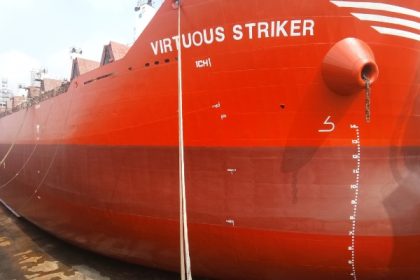
Enterprises Shipping & Trading SA selects PPG’s biocide-free fouling release coating.
PPG announced that Enterprises Shipping & Trading SA (EST) has selected PPG SIGMAGLIDE 1290 biocide-free silicone fouling release coating to reduce the carbon and improve the energy efficiency emissions of its fleet.
EST aims to improve its environmental performance through investments in energy-efficient technologies. The company selected PPG Sigmaglide 1290 coating for its ability to minimize the frictional resistance of the fleet’s hull surfaces, which decreases power demand and related emissions.
PPG performed few studies in cooperation with leading independent marine institutes to measure the power and speed impact on vessels retrofitted with PPG Sigmaglide 1290 fouling release coating. Those tests determined that the coating provides a 20% reduction in power consumed at design level, and up to 35% reduction in carbon dioxide emissions when compared with traditional antifouling coatings.
EST vessels that were retrofitted with energy-efficiency technologies are demonstrating a power reduction of more than 20%. PPG Sigmaglide 1290 coating has been a major contributor to this performance.
“EST is a pioneer in energy-efficient operations and is devoted to minimizing its environmental impact,” said George Sarris, president, Enterprises Shipping & Trading SA. “Our investment in PPG Sigmaglide 1290 coating is a major contributor to our goals of achieving the maximum efficiency potential of our fleet and not only meeting but exceeding the carbon reduction goals set by the International Maritime Organization (IMO).”
“PPG Sigmaglide 1290 silicone coating can help shipowners comply with IMO regulations by contributing to a significant speed improvement and increased operational efficiency,” said Ariana Psomas, PPG segment director, newbuilding and drydocking, Protective & Marine Coatings. “The coating’s ultra-smooth surface enables vessel operators to enhance their speed and save on power consumption while also resisting even the most challenging fouling conditions.”
